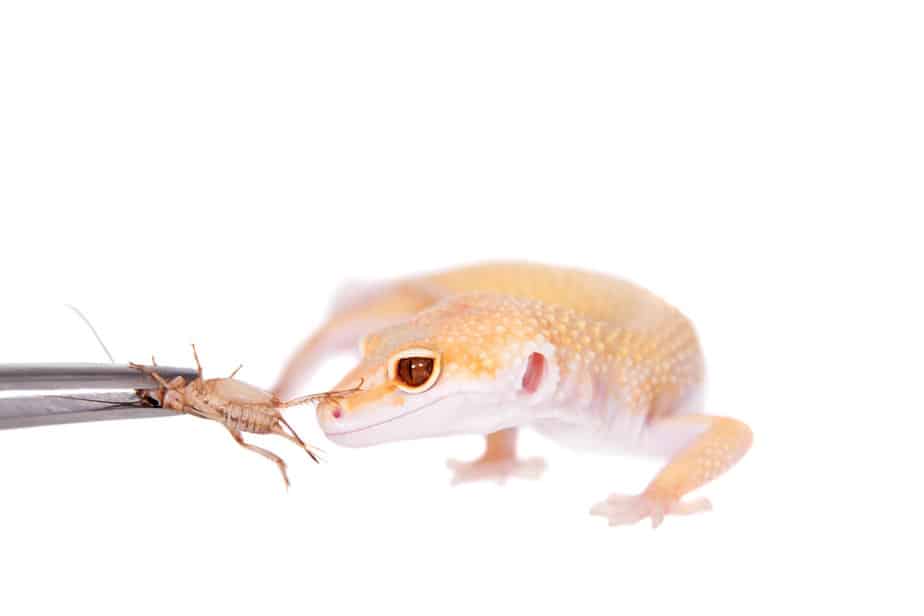Feeding your leopard gecko correctly is the most important part of your job as its caretaker.
To help you out, I’ve created a full feeding schedule (see below) and answered some of the most common questions that I get on this topic.

How Often to Feed Your Leopard Gecko by Age (baby, juvenile, adult)
| Leopard gecko age | Feeding frequency |
| Baby (0 to 6 months) | Every day (with some off days from 4 months of age) |
| Juvenile (6 to 12 months) | Every other day |
| Adult (12+ months) | Every 2 to 3 days |
Baby and juvenile leopard geckos need to eat more often than adults to fuel their growth. Calcium and protein are particularly important for young geckos.
Baby leopard geckos need to eat every day. Once they are 4 months of age, you can introduce some off days here and there.
When they reach 6 months of age, you can start feeding them every other day – this should continue even in adulthood.
If your adult leopard gecko is healthy, you can feed them every 3 days. However, keep in mind that sick leopard geckos must be fed daily until they recover.
Here is a table to help you schedule your leopard gecko’s feeding times:
Ultimately, it’s best to make your leopard gecko’s feeding schedule as predictable as possible.
How often to feed a leopard gecko in brumation
You shouldn’t feed a leopard gecko in brumation. Stop feeding your leopard gecko around ten days before brumation is supposed to start.
This is because your gecko’s digestive system slows down during brumation.
Offering food during or just before this time will lead to undigested food accumulating and rotting in your gecko’s digestive tract.
This can lead to inflammation, bloating, and even infections.
All you need to offer your leopard gecko during brumation is water.
Your pet may wake up once in a while to walk around and drink some of the water you leave out for them.
Keep in mind though – you’ll have to feed your leopard gecko a little more than usual when they come out of brumation.
How often to feed a leopard gecko that is laying eggs
While a female leopard gecko is preparing to lay eggs, she needs a lot of nutrients, especially calcium and protein. It’s important to feed a gravid leopard gecko every day and provide it with calcium and vitamin supplements.
This is because the egg growing and laying process requires a lot of energy.
Unfortunately, these leopard geckos have been known to reject food, especially as the pregnancy progresses.
This usually happens because their bellies get swollen and leave little space to accommodate food. As such, they usually stick to small portions or stop eating altogether for weeks on end.
However, you still need to offer them food every day. If your leopard gecko is struggling with hunting, you can even try hand feeding them, albeit gently.
Should I feed my leopard gecko daily?
You shouldn’t feed your Leo every day unless they are a baby, sick, underweight, or gravid. And in the last three cases, you should go back to feeding them every other day when they recover.
Can you overfeed your leopard gecko?
Yes, you can overfeed your leopard gecko. This usually happens when you offer massive portions or feed them too frequently.
When you do this, your reptile may regurgitate its food and/or become lethargic. To make matters worse, your reptile can gain weight and become obese.
Keep in mind that a healthy leopard gecko usually has a flat stomach and its body is at most as fat as its tail.
So if your leopard gecko’s body is fatter than its tail, it has a fat stomach, and it seems lethargic, it’s time to feed your reptile less and cut out fatty foods.
A good rule of thumb when deciding on appropriate portions for your leopard gecko is to offer two insects for every inch of body length.
Another approach is placing several insects in the tank and taking out any that are left after 15 minutes.
Can you feed your leopard gecko once a week?
While leopard geckos can survive one week without being fed, leaving them this long before offering them food is not advisable.
If you do this, you force your leopard gecko to depend on the fat reservoirs in their tails for sustenance. This can make them lose some tail fat and is not sustainable in the long run.
What is the best time of day to feed a leopard gecko?
The best times to feed your gecko are at dusk or dawn. This is because leopard geckos are crepuscular and are most active during those times.
Even in the wild, these are times that these geckos usually go out to hunt.
During these times, it’s more comfortable for them to move around because the temperatures are mild and the light is dim. These are also the times that feeder insects are more active and available.
The dim lights of dusk and dawn also make it harder for predators to hunt wild leopard geckos. Most leopard gecko owners usually choose to feed their reptiles at dusk though.
This is because it’s more convenient for most people – 7 PM to 9 PM is a particularly popular timeframe.
Whichever time frame you choose, stick to it – your leopard gecko’s feeding schedule should be as predictable as possible.
Final thoughts
Ultimately, how often you should feed your leopard gecko depends on its age, health, and whether it’s gravid.
So as long as you’re attentive to your leopard gecko, creating a feeding schedule for it should be easy.
Whatever you do though, keep it simple and predictable – leopard geckos don’t like surprises or changes. These stress them out and can hinder their appetites.
